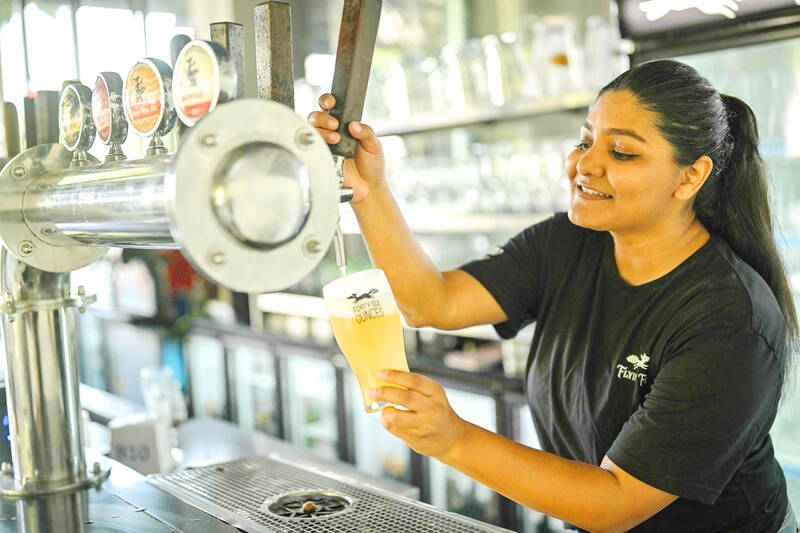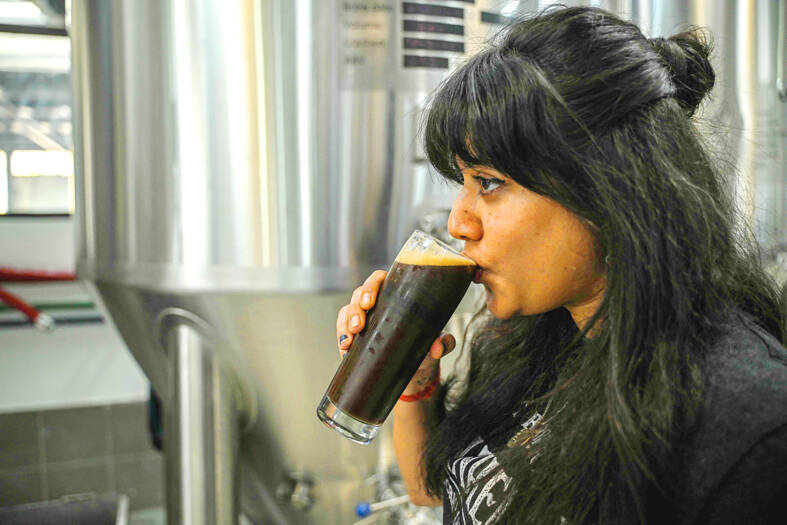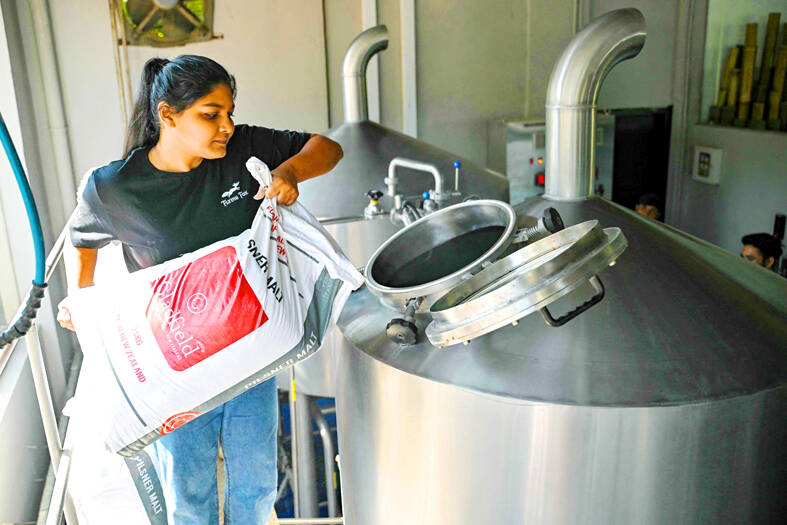As a fixture of India’s burgeoning craft beer scene, Varsha Bhat is a rarity twice over: first as a woman who brews alcohol, and second as a woman who drinks it.
Bhat is staking a claim to a male-dominated industry in a country where social mores compel most women to stay teetotal. The 38-year-old had for years weathered barbs from male peers questioning whether she had the muscles to carry hefty bags of hops or was calm enough to deal with the job’s pressures.
However, after a decade in the industry she has risen to become head brewer at one of Bengaluru’s most popular pubs, catering for the city’s moneyed young tech workers.

Photo: AFP
“There’s nothing a woman can’t do that a man can ... from recipe development, to the physical work, to managing a team,” Bhat said.
“We’ve taken that step to come forward and say that we can do it,” she added. “There was a stigma ... we’re breaking those stereotypes and barriers.”
Bengaluru has long been renowned for a more liberal drinking culture than the rest of India — a country where 99 percent of women do not drink, government figures showed.

Photo: AFP
Its signature technology industry employs a young and highly educated workforce drawn from elite universities, often arriving without established social connections to the city.
That provides a roaring trade to Bengaluru’s thriving craft beer bars, with in-house breweries employing hundreds and a clientele eager to meet new people and ready to burn money.
The city’s workforce is an anomaly in a country where only 25 percent of working-age women are formally employed, official statistics showed.

Photo: AFP
By comparison, they account for nearly 40 percent of those working at Bengaluru’s tech firms — a testament to the city’s ability to draw ambitious women from elsewhere in India, large numbers of whom are seen chatting raucously with friends in bars after hours.
Among them is Lynette Pires, 32, who moved to Bengaluru to work as a pharmaceutical researcher, but quickly found herself drawn to the brewing business.
Her path to becoming the brewer at a burgeoning outdoor beer garden in the city’s south forced her to assert herself over male colleagues who refused to take her seriously.
“Standing there in mostly a male-dominated room and trying to get your opinion across or trying to get them to listen ... you have to learn how to overcome that and move past it,” she said.
Four years ago she founded the Women Brewers Collective, which, along with more than a dozen other women working in the city’s brewpubs, aims to smooth the path for those who come next.
“I definitely want to be a role model for other women brewers,” Pires said. “That’s what it’s all about — to inspire and help develop other women who are entering the industry.”
While Bhat and Pires are trailblazers in their own city, women have been the pillars of the brewing industry since ancient times.
The first recorded beer recipe is thought to have been written on a piece of clay in 1800 BC as an ode to Ninkasi, the Sumerian goddess of beer.
Around the same time in Mesopotamia, the Code of Hammurabi, among the earliest known laws, referred to female tavern owners.
Given that history, it was “crazy and a little immature and ignorant when people say it’s a man’s drink,” said Girija Chatty, host of a podcast about India’s beer industry.
Drinking is often frowned upon in India, with independence leader Mahatma Gandhi one of the most strident voices in favor of temperance and abolition.
India’s 1949 constitution enjoins the government to ban drinking except for “medicinal purposes,” a clause largely ignored except for prohibitions imposed in some states.
Even among the small minority of Indians who do drink, the divide between the sexes is stark — nearly 15 times as many men as women imbibe, a government health survey published in 2022 showed.
Among the small number of women who frequent bars, that divide and its attendant social expectations are still easy to spot. Chatty cites the regular instance of waiters reflexively handing the drinks menu to any man seated at the table — rather than the woman who asked for it in the first place.
“If women can handle bitter men, they can very well handle bitter beer,” she joked.

Real estate agent and property developer JSL Construction & Development Co (愛山林) led the average compensation rankings among companies listed on the Taiwan Stock Exchange (TWSE) last year, while contract chipmaker Taiwan Semiconductor Manufacturing Co (TSMC, 台積電) finished 14th. JSL Construction paid its employees total average compensation of NT$4.78 million (US$159,701), down 13.5 percent from a year earlier, but still ahead of the most profitable listed tech giants, including TSMC, TWSE data showed. Last year, the average compensation (which includes salary, overtime, bonuses and allowances) paid by TSMC rose 21.6 percent to reach about NT$3.33 million, lifting its ranking by 10 notches

SEASONAL WEAKNESS: The combined revenue of the top 10 foundries fell 5.4%, but rush orders and China’s subsidies partially offset slowing demand Taiwan Semiconductor Manufacturing Co (TSMC, 台積電) further solidified its dominance in the global wafer foundry business in the first quarter of this year, remaining far ahead of its closest rival, Samsung Electronics Co, TrendForce Corp (集邦科技) said yesterday. TSMC posted US$25.52 billion in sales in the January-to-March period, down 5 percent from the previous quarter, but its market share rose from 67.1 percent the previous quarter to 67.6 percent, TrendForce said in a report. While smartphone-related wafer shipments declined in the first quarter due to seasonal factors, solid demand for artificial intelligence (AI) and high-performance computing (HPC) devices and urgent TV-related orders

Prices of gasoline and diesel products at domestic fuel stations are this week to rise NT$0.2 and NT$0.3 per liter respectively, after international crude oil prices increased last week, CPC Corp, Taiwan (台灣中油) and Formosa Petrochemical Corp (台塑石化) said yesterday. International crude oil prices last week snapped a two-week losing streak as the geopolitical situation between Russia and Ukraine turned increasingly tense, CPC said in a statement. News that some oil production facilities in Alberta, Canada, were shut down due to wildfires and that US-Iran nuclear talks made no progress also helped push oil prices to a significant weekly gain, Formosa said

MINERAL DIPLOMACY: The Chinese commerce ministry said it approved applications for the export of rare earths in a move that could help ease US-China trade tensions Chinese Vice Premier He Lifeng (何立峰) is today to meet a US delegation for talks in the UK, Beijing announced on Saturday amid a fragile truce in the trade dispute between the two powers. He is to visit the UK from yesterday to Friday at the invitation of the British government, the Chinese Ministry of Foreign Affairs said in a statement. He and US representatives are to cochair the first meeting of the US-China economic and trade consultation mechanism, it said. US President Donald Trump on Friday announced that a new round of trade talks with China would start in London beginning today,